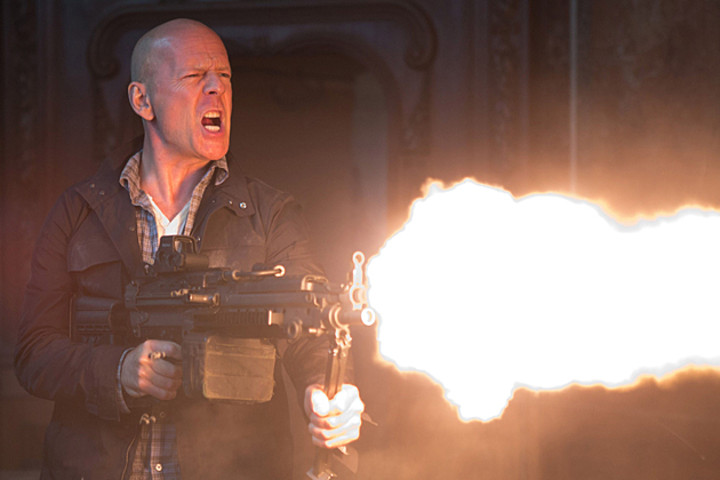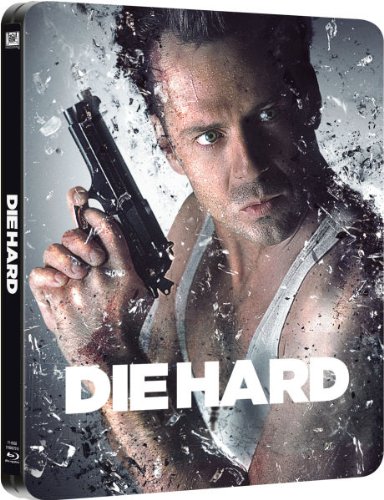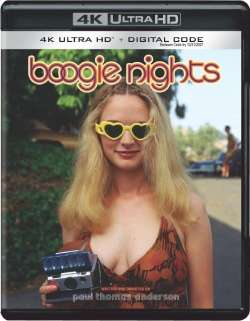Welcome back to “I’m All Out Of Love”, in which I take a pop culture subject (film series, director, actor, television show, etc) and dissect how my ‘love’ of them from early on slowly dwindled and what my current stance on them is.
Walter Bruce “Bruno” Willis is, if nothing else, a multi-talented actor. With a very diverse resume of television, film and even music related work, he’s proven himself as a capable and engaging presence. From his early years on the show Moonlighting to his action heavy roles to his more layered recent dramatic turns, he always gave such a diverse plethora of roles a try with the sort of relatable allure that made him not just an action star, but a full fledged leading man. Yet, for most of the last decade, he’s managed to squander all that likability on straight to video looking garbage that gives him little room to care.
In fact, the impetus for writing this article is the very limited theatrical release of his latest dull sci-fi thriller vehicle Vice this weekend, which also features a similarly out of work and dispassionate Thomas Jane. Didn’t hear about it? Well, not surprising given this horrible trailer, where Willis is showing off little of the personality that impressed so many, electing to merely smirk at the camera and deliver his lines in the most mechanical manner possible. Back in his hey day, Willis had so much charisma bursting out of his extremely talented body, so why doesn’t he use that anymore? Well, before looking at why he disappointed, let’s remember what set up those expectations.
The Spark
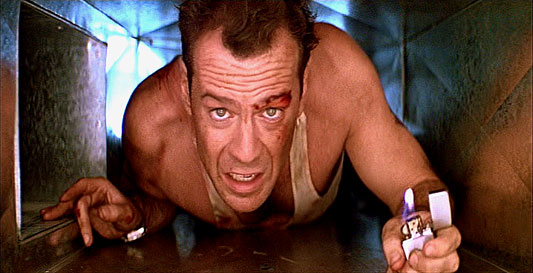
The first Bruce Willis film I ever saw was Look Who’s Talking. For those younger folks unaware, the film centers around a new mother (Kirstie Allie) falls for a cab driver (Travolta), all while Willis delivers commentary as the inner adult thoughts of her infant son (voiced by Willis). While not the finest hour for any of those actors, the film instilled an initial and vital connection between Willis’ voice and sarcastic comebacks. Not too long after Talking, I was shown the glorious piece of 80s action that was Die Hard. Those who are even slightly aware of Willis probably know him as John McClane, the New York cop trying to visit his estranged wife & family on Christmas, but just can’t get past those damn European terrorists who have taken the office building she works at hostage. This action classic turned Christmas classic has obviously inspired many an action picture, from the various sequels to the literal “Die Hard On A _____” trope that glutted the 90s. But there was a more important aspect to the film than the premise.
Die Hard sticks with me for more than the funny one liners or elaborate set pieces. It sticks with me because of Willis. With other 80s classic action movies I had been exposed to up to that point, the star was always so much more alien to me. Arnold Schwarzenegger and Sylvester Stallone weren’t people I related to as a suburban white kid from Florida. They were giant cartoon strongmen that I could potentially look up to, but their appeal never really centered on relatability. With Willis as McClane, there was something relatable about him. Sure, he was buffer and more witty than most adults I came in contact with, but I could believe a guy like McClane existed. He felt like a cocky cop working to try and dissolve a horrifying situation to protect his wife at all costs. The scene that pins this down beautifully is when Willis talks to Reginald VelJohnson as he takes the glass out of his foot. It’s a small moment of weakness that made an action hero vulnerable and honest, which made his assault against the faux-erudite Hans Gruber all the more investing. It set Willis apart as more of the everyman action hero, which was enough to get me interested in his work.
The Love Affair
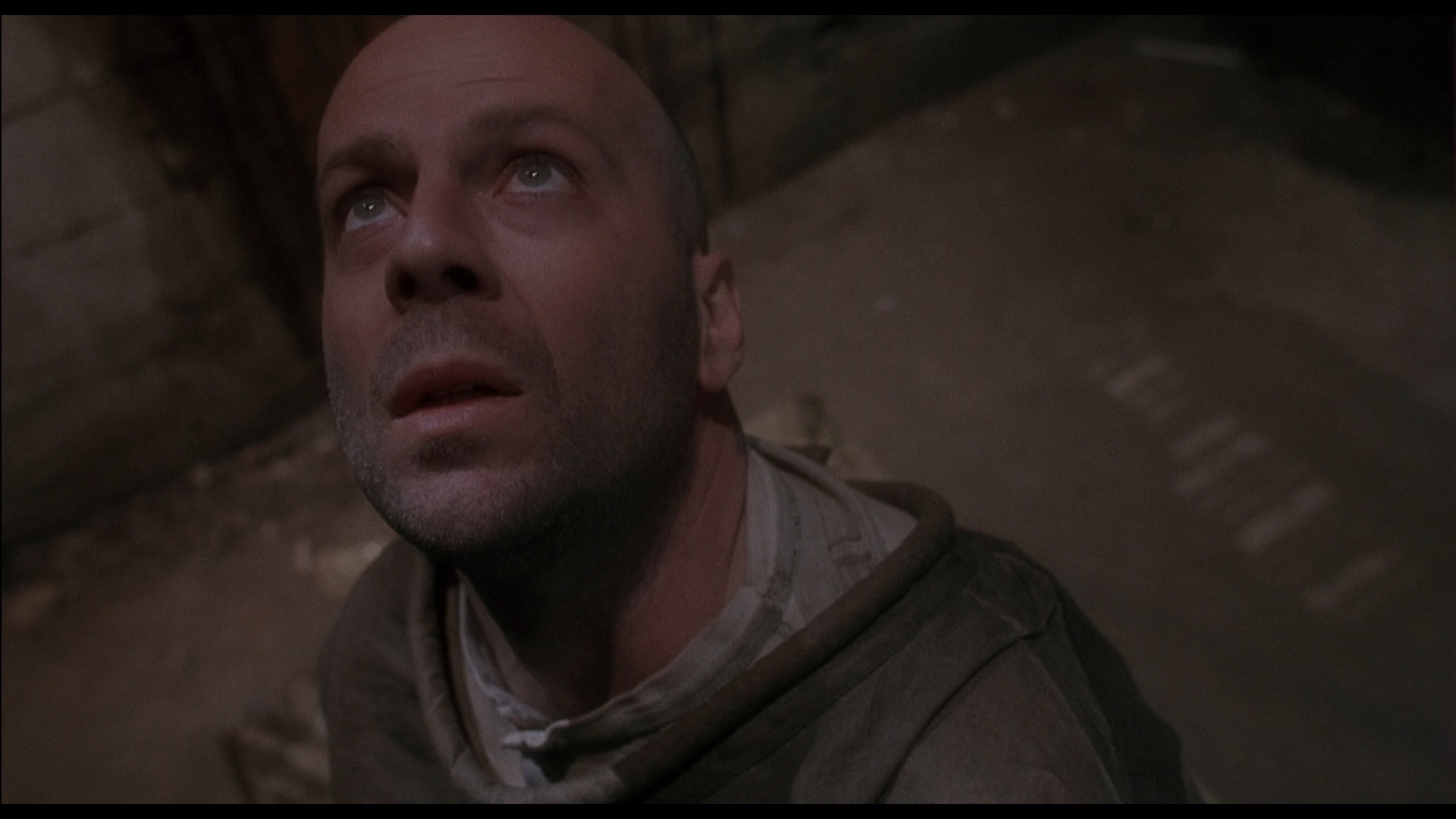
Despite making a name and money for himself off of the Die Hard franchise in the late 80s/early 90s, early Willis admirably pursued roles that were rather risky. The bizarro sci-fi of Twelve Monkeys and The Fifth Element, the over the top comedy of Hudson Hawk & Death Becomes Her, the quirky action of Last Boy Scout & Last Man Standing. They all showcased the true range he had as an actor, with the most notable performances here really being his nebishely nerdy role in Death Becomes Her and his disaffected and constantly out of breath time traveler in Twelve Monkeys. Of course, sometimes these choices didn’t work for him, particularly Bonfire of the Vanities and Hawk which were both critical and commercial flops that were plagued by the first reports of Willis’ giant ego on set. Then again, this era also produced his role in Pulp Fiction, which showed off more shades of his charismatic and engaging appeal than even the original Die Hard did as well as his willingness to take on smaller character driven material. Plus, it’s hard not to divorce Willis from the iconic image of him holding that katana during the assault against Zed.
So essentially, regardless of the project, Willis was willing to take roles that were off the beat and path, which made each new Willis film a curiosity for displays of his abilities. My favorite examples of Willis’ true range as an actor though would be his roles in two of director/writer/actor/producer M. Night Shyamalan’s worthy projects The Sixth Sense and Unbreakable. Both presented Willis as far more layered and grounded characters which showed off his more dramatic aspects of his range, whether it be the psychiatrist hoping to improve his abilities so as not to fail another patient in Sixth Sense or the ordinary man realizing his true potential as a superhuman protector in Unbreakable. One of my personal quintessential Bruce Willis scenes is Unbreakable when he looks at his son after he reveals his powers and superhero nature. Willis dug into the same kind of passion for the art that he had back in the glass foot scene and sold the very quiet yet beautiful sense of discovery and true connection that makes the family dynamics of the film all the more engaging. It’s a nuanced, subtle and full of believable human interaction, showing that Willis really could play a down to earth human being, even when he gets superhuman abilities. Shame that ability wouldn’t last.
Nothing Lasts Forever
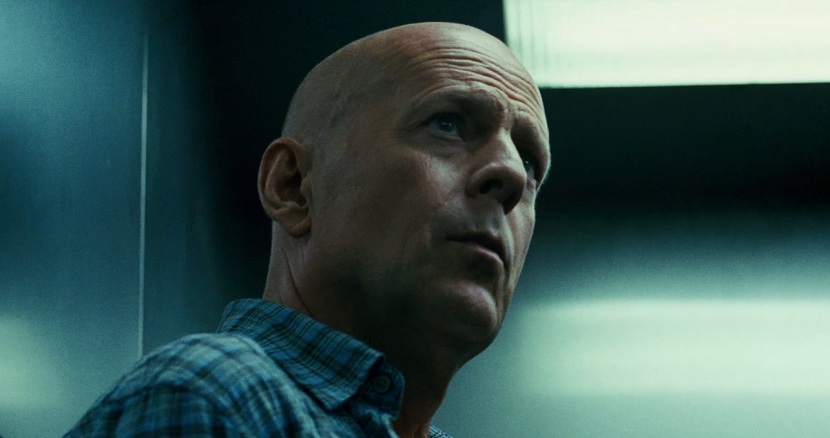
There comes a time in every action star’s career when they can’t handle the more physical stunts out there and may need to shake things up. Some try to reinvent their old characters, others pursue careers in politics. In the case of Bruce Willis, the ultimate decision was to not really care anymore. Following his role in Unbreakable, most of his output has been forgettable actioners like Hostage, Surrogates and his Expendables cameos. Each performance is filled with the passive glow in his eye and forced delivery that feels like a parody of the lovable wisecracker Willis used to be. Yet, even his comedy fair severely dwindled, moving from his likable cocky jerk with a heart of gold persona to a stiff awkward stick in the mud that barely gives the admittingly awful material of films like Cop Out, Red and Lay the Favorite any chance to breathe, suffocating all the potential comedy in his scrunched up mouth. It didn’t help that the first of those films was infamously marked by comments from Kevin Smith of his lack of effort but then again, lack of effort has never stopped Smith before.
Of course, one can’t help but comment on the giant decline in the Die Hard franchise since it’s return with Live Free or Die Hard whenever the subject of Willis’ decline comes into play. Yet, I personally didn’t see the completely bored Willis in that fourth entry of the franchise. I saw a Willis who, while clearly older, still managing to kick some ass with a bit of charm in a movie that was admittingly lesser than the usual content of the franchise. However, with A Good Day To Die Hard, I saw no such charm. I saw a husk of a hero, barely being able to crack a “Yippie Ki-Yay” without looking bored out of his mind or even try to have any sort of chemistry with his equally bland and bored looking “son” Jai Courtney. The moment that crystallized the death of the franchise and Willis’ career in action has to be when McClane & “Son” fall through a glass roof. The once endearingly human action hero John McClane had officially lost everything that made him relatable, becoming the action hero who brushes off the same glass that severely hurt his foot. It showed that Willis really no longer cared about any sort of consistency with the reality of the character that made him a star. He just took the check and moved on quickly to the next thing he was contractually obligated to finish. It hurts to see heroes fall so far.
Final Thoughts
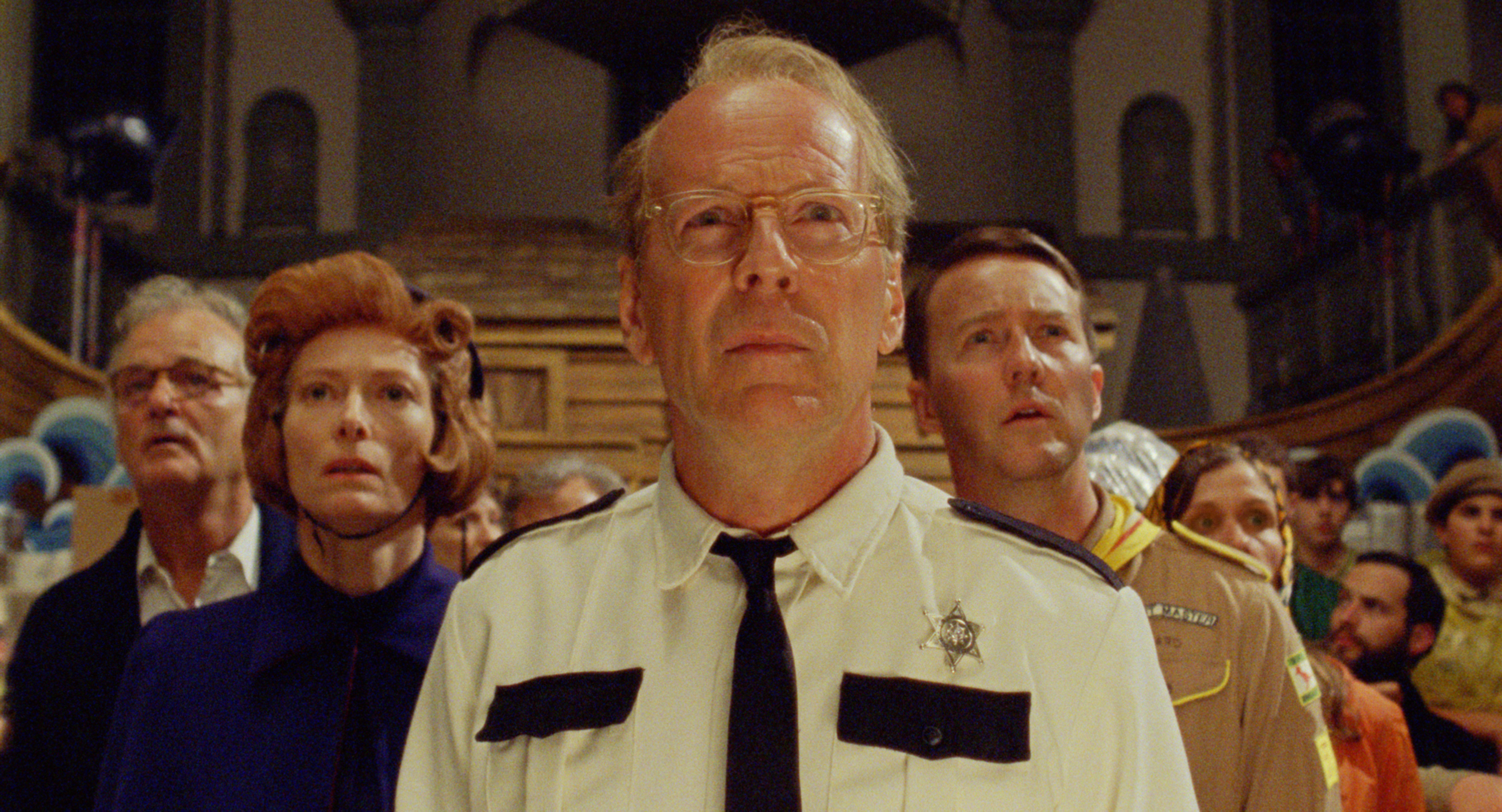
Willis has said in the past that he’s bored with the typical action roles he’s gotten as of recent, especially after years of doing them. That’s all well and good to be bored… but reports of Willis’ ego involving Smith or his pay demands for potentially appearing in the third Expendables really do show off that pay and pettiness haved replaced the passion he’s lost. Admittingly, every actor has to eat and I can see that most of the roles he gets with boring action parts can get grating, but a truly professional actor can still try their hardest while doing jobs they hate. People like Morgan Freeman and Michael Caine admit that they work for the paycheck all the time, but they rarely turn in lazy performances. As part of research for this article, I watched the pilot for Moonlighting, a show I was non-existent for during it’s initial airing. Seeing a pre-Die Hard Willis was quite an odd experience, partially due to seeing Willis with a decent head of hair. Yet, the bigger oddity is seeing a Willis that still seemed bright eyed and able to light up a room. It feels like so long ago that we had the wisecracking badass that managed to ground himself in something tangible, emotional and human. More than not these days, he just seems like a robot. Hell, he was more of a robot as his human character in Surrogates than he was as his robot surrogate!
Yet every now and then, Willis still shows his talents in some form. 2012 for example showcased Willis excellently with his roles as a time displaced older version of Joseph Gordon-Levitt in Looper and as a lonely police officer attempting to find the two main missing children characters in Moonrise Kingdom. Both are subtle, but oddly touching performances that gave Willis fine material to work with. In Looper, his love for his departed wife and determination to destroy the future that would lead to her death feels real and the way he plays off Levitt as his younger self seemed believable, given how much the two ape off each other small yet engaging ways. The same goes for Kingdom, where Willis builds an understated yet oddly warm surrogate father relationship with newcomer Jared Gilman that serves as the heart of the film. So, when talents like Looper writer/director Rian Johnson or Moonrise writer/director Wes Anderson actually give him appropriately meaty material, Bruce Willis can still actually breathe life into his characters. At the same time, Willis should be more willing to take parts like these and less of Vice if he wants to eventually end his career on a good note. Maybe another team up with Quentin Tarantino is in order. Of course, he could always try to reinvent himself and go back to his musical persona Bruno… or maybe not.

Interested in picking up some of the titles mentioned in the article? Please use our Amazon links to do so!



